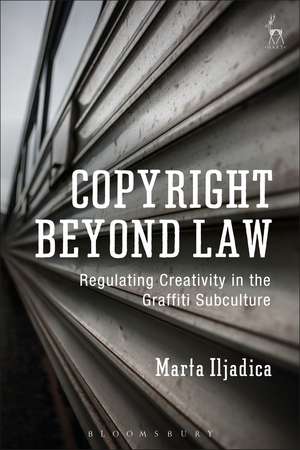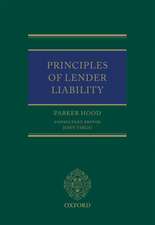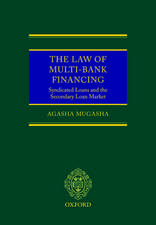Copyright Beyond Law: Regulating Creativity in the Graffiti Subculture
Autor Marta Iljadicaen Limba Engleză Hardback – 16 noi 2016
| Toate formatele și edițiile | Preț | Express |
|---|---|---|
| Paperback (1) | 272.59 lei 6-8 săpt. | |
| Bloomsbury Publishing – 20 mar 2019 | 272.59 lei 6-8 săpt. | |
| Hardback (1) | 571.24 lei 6-8 săpt. | |
| Bloomsbury Publishing – 16 noi 2016 | 571.24 lei 6-8 săpt. |
Preț: 571.24 lei
Preț vechi: 817.39 lei
-30% Nou
Puncte Express: 857
Preț estimativ în valută:
109.31€ • 119.11$ • 92.11£
109.31€ • 119.11$ • 92.11£
Carte tipărită la comandă
Livrare economică 23 aprilie-07 mai
Preluare comenzi: 021 569.72.76
Specificații
ISBN-13: 9781849467773
ISBN-10: 1849467773
Pagini: 328
Dimensiuni: 156 x 234 x 30 mm
Greutate: 0.64 kg
Editura: Bloomsbury Publishing
Colecția Hart Publishing
Locul publicării:London, United Kingdom
ISBN-10: 1849467773
Pagini: 328
Dimensiuni: 156 x 234 x 30 mm
Greutate: 0.64 kg
Editura: Bloomsbury Publishing
Colecția Hart Publishing
Locul publicării:London, United Kingdom
Caracteristici
This book examines findings from empirical research undertaken into the graffiti subculture in London to show that graffiti writers informally regulate their creativity.
Notă biografică
Marta Iljadica is Lecturer in Intellectual Property at the University of Glasgow.
Cuprins
Panel I: Context1. Graffiti History and Development 2. Copyright, Creativity and Commons 3. Methodology: Reflections on Fieldwork Panel II: Form4. Copyright-Subject Matter 5. Graffiti Rules-Write Letters, Choose Spots Panel III: Copying6. Copyright-Originality and Infringement7. Graffiti Rules-Be Original, Don't Bite Panel IV: Reputation8. Moral Rights 9. Graffiti Rules-Don't Go Over Panel V: Interactions10. Graffiti Rules and Copyright Law
Recenzii
Copyright Beyond Law: Regulating Creativity in the Graffiti Subculture makes a strong contribution to the intellectual property scholarship by offering a highly illuminating and compulsively readable legal discussion that dares to move outside the boundaries of the law and ask what lessons we could learn from self-governed, outlaw communities compelled to forbear copyright protection
Copyright Beyond Law is the type of book I fantasise about writing. It combines empirical research with structured analysis to present a nuanced view of copyright, cultural norms and IP protection beyond IP rights, with just the right touch of interdisciplinarity. I would have really liked to see images of graffiti in the book, but the author is right to respect her understanding of their copyright. Copyright scholars, sociologists and lawyers involved in graffiti cases will find this book most useful.
All in all, Iljadica's book manages brilliantly to narrate how graffiti creativity works and is regulated from the inside.
Iljadica artfully weaves themes through the book, moving between empirical, historical, quasi-sociological, and doctrinal discussion in a way that rewards a linear reading...Iljadica's work provides much-needed comparative analysis with important implications for assessing the proper role and need for moral rights.
Copyright Beyond Law is the type of book I fantasise about writing. It combines empirical research with structured analysis to present a nuanced view of copyright, cultural norms and IP protection beyond IP rights, with just the right touch of interdisciplinarity. I would have really liked to see images of graffiti in the book, but the author is right to respect her understanding of their copyright. Copyright scholars, sociologists and lawyers involved in graffiti cases will find this book most useful.
All in all, Iljadica's book manages brilliantly to narrate how graffiti creativity works and is regulated from the inside.
Iljadica artfully weaves themes through the book, moving between empirical, historical, quasi-sociological, and doctrinal discussion in a way that rewards a linear reading...Iljadica's work provides much-needed comparative analysis with important implications for assessing the proper role and need for moral rights.











